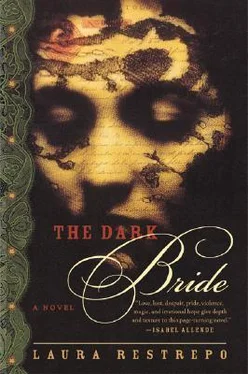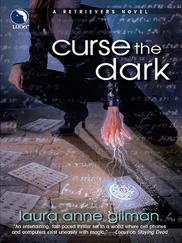What is certain is that Payanés stood there in the arched entryway without knowing what to say, without wanting to interrupt that everyday ceremony of women in their cool and shaded patio in contrast with the iridescent heat of the street, and that he stayed there, less observing than remembering, as if dreaming about something he’d already seen before, in the privileged days of a more pious era. These girls could be my sisters, he must have thought, or any man’s sisters, and Sayonara could be my wife, or my brother’s girlfriend, and that lady Todos los Santos, or another just like her, could be my mother, and this house, why not, this house could have been my house.
“What about the violet light?” I asked Olga. “The violet light must have brought him back to earth…”
“The lights were turned off in the mornings, and an extinguished light is a silent light.”
They say that Payanés felt invaded by a calmness that partially mitigated the ravages of his hangover, due to a sort of reencounter with his own insides and a sudden realization that despite everything the world was still the same as he remembered it from his childhood.
“Wake up, boy,” Todos los Santos said suddenly, as if she had read his mind. “This isn’t a house of sisters or girlfriends, this is a house of putas .”
“Tell Sacramento that I thank him, but I’m sending his money back to him because I’m not thinking about giving up this life, which hasn’t turned out badly,” Sayonara said to him when he gave her his friend’s pay. “Tell him that while he’s away to send me more postcards, because I haven’t received any for a while and I miss them.”
Then Payanés assured her that Sacramento hadn’t sent postcards or come down to Tora because of work-related impediments, but that he always thought of her, that he was generally all right and in perfect health.
In perfect health: They assure me that was what he said. Why didn’t he say a word about the malaria that was consuming Sacramento? Why didn’t he talk about the white hospital where the nurses soothed the shadow that was left of him, of the constant shivering and fevers, of the faith deposited in quinine with side effects perhaps more noxious than the illness itself? Why did he, Payanés, always collaborative, solid, trustworthy, fail just now? So as not to give away his friend, perhaps; out of fear of being indiscreet, or in order not to worry them with bad news… or because of the same shame that causes all members of the male sex to be silent when dealing with that which deeply concerns human beings? As if loneliness, joy, weakness, pain, or malaria were shameful, nameless things that one should never admit, even in the confessional, or to a doctor, or even to oneself.
Although, truth be told, I think I can sense another motive for Payanés’s having kept silent, which is that over time, as I got to know Sacramento better, I began to doubt that he truly had been sick. With malaria, I mean, because he was always sick: with anxiety. Hungry to love and to be loved, to forgive and be forgiven, whipped by guilt of his own and of others, a bird that was always lost in the clouds of other firmaments, incapable of being happy with what his eyes see and his fingers touch — raging with fever, yes, but with fever wavering between utopias and the certainties at hand; with mythical love, but only sworn before a notary. And the vomiting: Was he struggling to throw out a swollen soul that would no longer fit inside his body?
Was Payanés also a prisoner of this suspicion about his friend and therefore hid the information about the complaint of malaria? That might have been. Did he omit the matrimonial message to Sayonara out of pure precaution, thinking that Sacramento himself, who was unaware of the girl’s double identity, wouldn’t want — of that he was almost certain — to marry someone that he saw as a sister? That might have been. Or maybe not?
It is clear that the most overwhelming hypothesis — the only serious one — would hold that behind this sin of omission could be the hand of fate that was gradually beginning to raise the foundation of a tragedy. Although I doubt that there is a genre that could be called tropical tragedy: The excessive light of the tropics blurs the sharp contours of any drama, makes it more rounded, wraps it in dreams, and finally dissolves it in forgetfulness.
Moved by a force greater than himself and acting against his custom and his helpful nature, Payanés had acted in accordance with his own convenience, in his own favor, from the moment that Todos los Santos and Sayonara had welcomed him so effusively and joyously, with fresh lemonade and the empanaditas they had fried up, as if the recent arrival had been Sacramento himself. Payanés, always concerned about taking care of others, had fallen prey to the temptation of allowing himself to be taken care of, of resting in the hands of others, because they had made him feel at home, in a house with clean laundry drying on lines, with chattering parakeets on a mango branch, wood burning in the stove, and chickens in the yard, everything that must taste like heaven to a man returning from the uncaring harshness of a work camp.
Ana, Juana, Susana, and Chuza spied on him from their hiding place behind a plantain tree and, mute with shyness, lowered their eyes when he asked them their names. Did Payanés think that on that patio he felt the noise of the world calm, the smell of lemons invite him to breathe, even if it was all only borrowed? He must have secretly been thankful for Sacramento’s absence, for the alignment of the stars that allowed him to fill the space the other man had left, to be for a while that other person who could not be there, to appropriate his air. And to fall in love with the woman to whom he is bringing someone else’s message of love? It is not surprising in any case that on this occasion Payanés would speak so little and so vaguely about the distant sick man.
“There’s an orillada today. Do you want to come?” invited Todos los Santos.
Sundays during the season when the river rose, when its waters were calm and full of fish, the women of La Catunga would organize what they called an orillada , an outing with grilled fish, rum, and a wood-wind band on la orilla , the shore, of the Magdalena, on one of the beaches of brown sand that would disappear a few months later, along with the fish, when the volume of flow would grow angry again and overrun the riverbanks.
“It’s thirty pesos,” Todos los Santos told him. “For that you get food, drink, music, and love.”
“Only thirty pesos? Then happiness is cheap.”
“Temporary happiness, maybe. The other kind doesn’t exist.”
When Payanés reached into his pocket to pull out his money, he realized that he had already spent all of his own and all he had left was Sacramento’s, which burned his fingers when he touched it. He turned it over and over in his head while the old lady waited with her hand extended. Sacramento, hermano , don’t take it wrong, he thought, trying to calm his stomach. I’ll repay these bills with identical ones.
An hour later, as he followed the thread of the river aboard a champán festooned for the party and overflowing with music and people, Payanés was still navigating foreign waters. He didn’t dance with the girls as the other men did, or drink rum straight from the bottle like the old women. Instead, he was quiet and took refuge from the sun under the roof of palm fronds and tanned hides, grateful for the north winds that tempered the morning air and helped disperse the antiquated tunes with which the band was trying to liven up the boat ride, but which in him stirred who knows what sharp sense of lack, like a needle in his heart. Olguita tells me this and I ask her if she isn’t perhaps speaking of a desired and nurtured longing, like the thorn on the rose that Payanés had requested be tattooed on his chest.
Читать дальше












